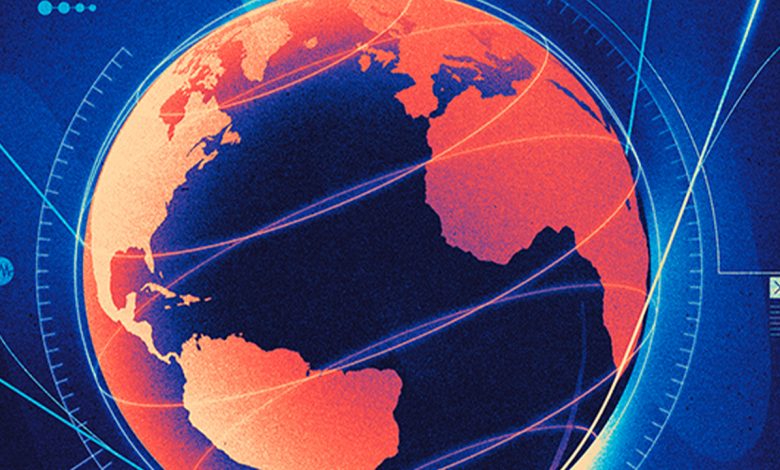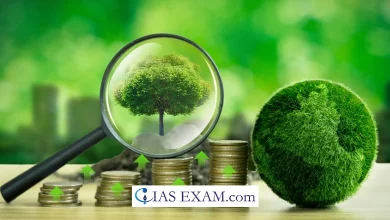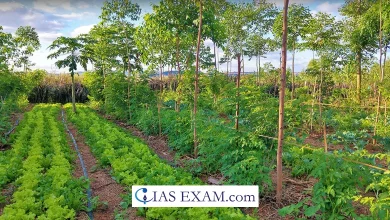
Context- Recently, the Global Risks Report 2023 has been released by the World Economic Forum (WEF).
Key Highlights
Most severe risks the world is to face in the next decade:
- Failure to mitigate climate change’
- Failure of climate change adaptation’
- Natural disasters and extreme weather events:
- It is the second-most severe risk that the world needs to be prepared for in the next two years.
- Biodiversity loss and ecosystem collapse
- Cost of living:
- It ranks as one of the most serious global risks in the short term (over the next two years).
Reason for such severe risks
- Current global pandemic
- War in Europe
Most impacted:
- The impact of natural disasters or extreme weather events particularly affects low- and middle-income countries.
- Such events account among the top five risks in 25 countries, especially developing coastal countries across Latin America, Africa and South-East Asia including India.
India:
- India has recorded extreme weather events on 291 of the 334 days between January 1 and November 30, 2022.
- It means that the country witnessed an extreme weather event of some sort in one or more of its regions for more than 87 percent of the time over these 11 months.
- These extreme events have a link with human-caused greenhouse gas emissions and further the climate crisis.
- Human-caused greenhouse gas emissions have led to an increased frequency and intensity of some weather and climate extremes since pre-industrial times.
Dangerous interconnections:
- Over the next 10 years or by 2033, the interconnections between biodiversity loss, pollution, natural resource consumption, climate change and socioeconomic drivers will make way for a dangerous mix.
Major global risks
- In the next 2 years Cost of living; Natural disasters and extreme weather events; Geoeconomic confrontation will stand as major risks.
- In the next 10 years Failure to mitigate climate change; Biodiversity loss and ecosystem collapse will be the most happening global risks.
What is ‘Global risk’?
- Global risk is defined as the possibility of the occurrence of an event or condition which, if it occurs, would negatively impact a significant proportion of global gross domestic product, population or natural resources.
- The Global Risks Report tracks global risks perceptions among risk experts and world leaders in business, government, and civil society.
- It examines risks across five categories i.e.
- Economic
- Environmental
- Geopolitical
- Societal
- Technological.
Rising Concerns
- The world is still struggling to make the required progress on climate change despite 30 years of global climate advocacy and diplomacy.
- Failure on climate action to address climate change’ has also continued to figure among the top risks in the report since 2011.
- Atmospheric levels of carbon dioxide, methane and nitrous oxide have reached record highs.
- Emission trajectories make it very unlikely that global ambitions to limit warming to 1.5°C will be achieved soon.
- Failure to mitigate climate change’ ranks as one of the most severe threats in the short term too. It is a significant global risk that the world is least prepared for.
- Existing measures to prevent or prepare for climate change have also been ineffective.
- Biodiversity within and between ecosystems is already declining faster than at any other point during human history but unlike other climate-related risks, ‘Biodiversity loss and ecosystem collapse’ has not been perceived to be of concern over the short term.
- Growing demands on public- and private-sector resources from these socio-economic short term crises attributed to geopolitical tensions, will reduce the speed and scale of mitigation efforts over the next two years.
Way Ahead
- Follow the Bottom-up Approach:
-
-
- Resilience would be more effective if it is built on a bottom-up approach, by understanding the actual needs of the community at the local level, rather than providing directions from the leadership.
- Democratisation of data:
- There is also a need for the dissemination of data to the general public in a more robust and simple manner as information is necessary to create an impact at the local level.
- It provides a nudge to the local communities and creates a competitive environment for better climate action.
-
- Expanding the horizon of Indian actions:
-
-
- Currently the efforts are concentrated in the field of energy emissions and utilisation of energy.
- However, there is also a need to apply the same to sectors like agriculture, which have a measurable impact on climate change.
- Protecting vulnerable communities:
- It is significant to protect the vulnerable communities from extreme events and rationalising the use of fertilisers and subsidies, to create a low carbon economy.
-
- Access to Finance:
-
-
- It is also important for the world to realise the importance of incentivising the developing countries towards the usage of renewable energy.
- Holistic view:
- A less carbon-intensive economy will benefit the country in the long term as India is a vulnerable country in the context of climate change.
-
- Strict implementation of the Agreements:
-
- The Kunming-Montreal Global Biodiversity Framework (GBF) was adopted at 15th Conference of Parties (COP15) to the UN Convention on Biological Diversity (CBD) is a significant breakthrough as far as global action on biodiversity is concerned.
- Other such agreements also have to be sincerely implemented and monitored.
World Economic Forum
- WEF is the International Organization for Public-Private Cooperation.
- The Forum engages the foremost political, business, cultural as well as other leaders of society to shape global, regional and industry agendas.
- It was established in 1971 as a not-for-profit foundation and its headquarter is situated in Geneva, Switzerland.
- It is independent, impartial and it is not tied to any special interests.
- The report aims to serve “as a compass to track progress on relative gaps between women and men on health, education, economy and politics”.
- Some major reports published by WEF include
- Fostering Effective Energy Transition report
- Global Competitiveness Report.
- Global Gender Gap Report.
- Global Risk Report.
- Global Travel and Tourism Report.
- Global Social Mobility Report
- Chief Economists Outlook





.png)



